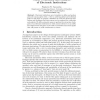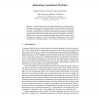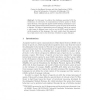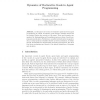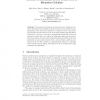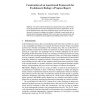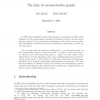100
click to vote
DALT
2004
Springer
15 years 5 months ago
2004
Springer
Electronic institutions are a formalism to define and analyse protocols among agents with a view to achieving global and individual goals. In this paper we propose a definition of ...
130
click to vote
DALT
2004
Springer
15 years 5 months ago
2004
Springer
Systems of autonomous agents providing automated services over the Web are fast becoming a reality. Often these agent systems are constructed using procedural architectures that pr...
DALT
2004
Springer
15 years 7 months ago
2004
Springer
Abstract. Agent interaction protocols are usually speciļ¬ed in terms of permissible sequences of messages. This representation is, unfortunately, brittle and does not allow for ļ¬...
122
click to vote
DALT
2004
Springer
15 years 7 months ago
2004
Springer
In this paper we address the challenges associated with the veriļ¬cation of correctness of communication between agents in MultiAgent Systems. Our approach applies model-checking ...
141
click to vote
DALT
2004
Springer
15 years 7 months ago
2004
Springer
The concept of a social norm is used in multi-agent systems to specify behaviours required of agents interacting in a given social context. We describe a method for specifying soci...
123
click to vote
DALT
2004
Springer
15 years 7 months ago
2004
Springer
In this paper, the notion of declarative goals as used in agent programming is central. Declarative goals describe desirable states and are updated during the execution of an agent...
129
click to vote
DALT
2004
Springer
15 years 7 months ago
2004
Springer
Abstract. We propose an extension of action theories to intention theories in the framework of situation calculus. Moreover the method for implementing action theories is adapted t...
119
click to vote
DALT
2004
Springer
15 years 7 months ago
2004
Springer
We report on the development of an agent-based system, called Ī¦LOG, for the speciļ¬cation and execution of phylogenetic inference applications. We detail the implementation of th...
121
click to vote
DALT
2004
Springer
15 years 7 months ago
2004
Springer
In 1992, Moss and Parikh studied a bimodal logic of knowledge and eļ¬ort called Topologic. In this current paper, Topologic is extended to the case of many agents who are assumed...
DALT
2004
Springer
15 years 7 months ago
2004
Springer
